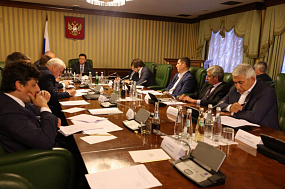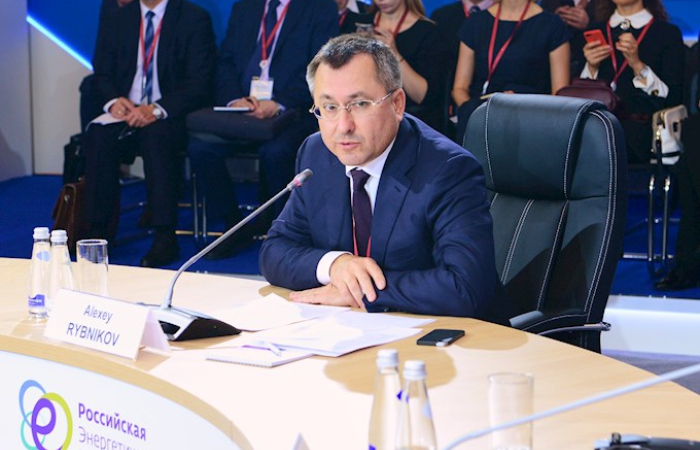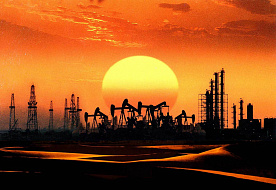October 3, 2019

Ways to Stimulate Oil Extraction in the Russian Federation Discussed at REW 2019

On 3 October, the panel discussion ‘Stimulating Oil Extraction in the Russian Federation’ was held at the REW 2019 Forum. The discussion featured representatives of federal executive bodies, heads of major petroleum companies, and industry experts.
Participants discussed the initial results and expected effects of measures recently enacted by the government to increase the volume of oil extraction and attract additional investment to the industry. They also discussed the need for additional incentives for oil extraction in traditional oil-extracting regions, the development of shelf projects, and an increase in the oil recovery ratio.
As of 1 January 2019, an experimental tax scheme has come into effect that introduces a windfall profits tax on hydrocarbon production, which is designed to partly take into account the real economics of extraction when imposing taxes. To attract additional investment to the oil extraction sector for 2019–2024 and prevent a reduction in extraction, a roadmap has been developed to implement measures aimed at exploring oil reserves and increasing the volume of oil extraction in the Russian Federation.
As Director of Tax Policy and Customs Schedule Department of the Ministry of Finance of the Russian Federation Alexey Sazonov noted, the relevance of these measures is not limited to the industry: tax income from the oil and gas industry is of critical importance to the long-term competitive advantage of the tax system at large.
“We are convinced that we have currently found a balance between industry interests and the interests of the government and society. In other words, income from the oil and gas industry – which we currently have – allows our tax system to be competitive. And, in the long run, this is a fundamental factor in determining the competitiveness of the economy. When the geopolitical storm dies down and when we finally, I am certain, tidy up our investment attractiveness and stability, our tax system will be vital to this process. The system’s competitiveness will be the determining factor in our economic development,” said Alexey Sazanov.
According to Deputy Minister of Energy of the Russian Federation Pavel Sorokin, the industry's tax system needs to be reinforced. This is due in part to the fact that the government wants to see the oil and gas industry serve as a driver of other industrial sectors.
“Fifteen years ago, when we were implementing the new tax system, the industry was in a terrible state. After the difficulties of the 90s, extraction was at less than half of what it was in the late 80s in the Soviet Union. The new tax system gave the industry a sort of stable foundation and was based on the realities of the time: a lot of spare capacity in both extraction and production. Those tax rates allowed companies to find sufficient financial resources to implement projects.
“In 2008, we saw the second stage of system reforms – a number of areas in need of additional support were identified. It acknowledged the fact that not all fields are identical, there are reserves that are hard to access and hard to extract and their production costs are completely different. Conclusions were made and new incentives were implemented for shelf oil and stimulating exhausted fields.
“We’re currently extracting 557 million tonnes and that figure is growing. There are limits imposed by our voluntary agreement with OPEC+ countries, but, nevertheless, the potential of our spare capacity is currently at a minimum of 500 thousand barrels over the next three months. At the same time, we are seeing that field development conditions are worsening. Despite the fact that this is a natural process, in order to produce the same volume of oil, you now need to exert more effort and spend more resources.
“The tax system that was enough to restore the industry's potential back then is currently not enough to facilitate the use of new technologies across all categories of reserves,” said Pavel Sorokin.
Aide to the Chief of Staff of the Presidential Executive Office Kirill Molodtsov also spoke in favour of additional stimulus for the oil and gas complex.
“We need 210–220 million tonnes to supply domestic demand for oil products. In the rest lies the potential for increasing or changing budgetary income through export. In 2025, we plan to create a unified market of Euro petrol stations. Among other things, this will have an effect on how we structure the industry’s tax system.
“Over the past 10 years, we've transitioned to a new extraction regime: we used to drill inclined wells, and now we drill horizontal ones. Technology has changed significantly in the industry with respect to extraction volumes and methods. We do not plan to stop here, not just in terms of import substitution, but in terms of technology as well. If we look for solutions to stimulate Western Siberia and increase extraction volumes, we will be able to reach the absolute values of extraction volume that we've set before ourselves. If the Ministry of Finances tells us that there needs to be more money coming into the budget, we can increase it. When they say, ‘that’s enough’, we will sustain that level of extraction. We need to concentrate on concrete objectives and concrete figures,” said Kirill Molodtsov.
Deputy Head of the Federal Agency for the Subsoil Use (Rosnedra) Orest Kasparov introduced those present to the results of the inventory of all cost-efficient oil reserves in the Russian Federation and all of the conclusions made related to correcting stimulus measures.
“There are currently 2,700 oil fields in the country containing 28.9 billion tonnes of reserves. We inventoried large oil fields with reserves of over 5 billion tonnes. There are 719 such fields in Russia, they contain 92% of all oil reserves. We paid close attention to the cost effectiveness of oil fields, sorting them by region, type of oil, and extraction difficulty. Based on our initial results, we can conclude that providing tax incentives to entire regions or reservoirs is inaccurate. Each individual field is unique with respect to its geology, the technologies required, etc. We need an individualized approach. I am certain that the existing tax system is fully capable of meeting modern demands. However, in order to make sure that development does not stop, in the future, we must differentiate our tax incentives,” said Orest Kasparov.
Wrapping up the discussion, panellists expressed the hope that inventories and differentiating tax incentives will be the key to finding a balance in this area and reaching the goals set before the oil and gas industry by the government.
The Russian Energy Week is organized by the Ministry of Energy of the Russian Federation and the Roscongress Foundation with the support of Moscow Government.





